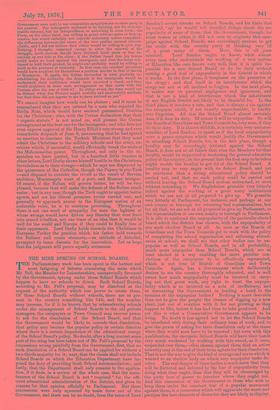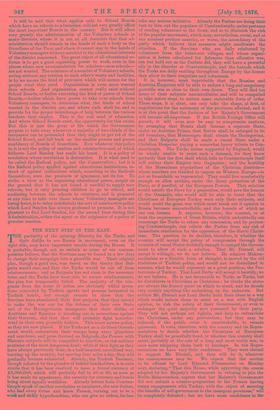THE MINE SPRUNG ON SCHOOL BOARDS.
THEParliamentary week has been spent in the hottest and most fatiguing of debates concerning the mine which Mr. Pell, the Member for Leicestershire, unexpectedly favoured by the Government, sprung under those School Boards which happen to have no schools to direct. Such School Boards, according to Mr. Pell's proposal, may be dissolved at the request of the authority which has power to create them. Of these School Boards without schools, there are at pre- sent in the country something like 540, and the number may increase, for if it be known that by retransferring schools under the management of School Boards to the old private managers, the ratepayers or Town Council may recover power to ask for the dissolution of the School Board, and that the Government would be likely to concede that dissolution, that policy may become the popular policy in certain districts where there is a certain impatience of the educational energy of the School Board's policy. No doubt, after a long contest, some part of the sting has been taken out of Mr. Pell's proposal by the concessions wrung painfully from the Government, first, that no such dissolution of a School Board can be applied for without a two-thirds majority for it; next, that the clause shall not include School Boards on which the Education Department have im- posed the duty of providing fresh School accommodation ; and lastly, that the Department shall only consent to the applica- tion, if it finds, in a review of the whole case, that the main- tenance of the School Board is not " required " for the effi- cient educationaladmin istration of the district, and gives its reasons for that opinion officially to Parliament. But these concessions were only squeezed by main force out of the Government, and there can be no doubt, from the tenor of Lord
Sandon's covert attacks on School Boards, and his hints that he could, 'an' he would,' tell dreadful things about the un- popularity of some of them, that the Government, though, for some reason or other, it did not care to originate this cam- paign against School Boards, was exceedingly anxious to get the credit with the country party of thinking very ill of a great many of them. Now, this is all pure mischief. Lord Bandon ought to know, what almost
every man who understands the working of a new system of Education like ours knows very well, that it is quite im- possible for a new School Board to do its duty without earning a good deal of unpopularity in the district in which it works. In the first place, it trespasses on the preserves of the clergy ; and that itself is an interference which the clergy are not at all inclined to forgive. In the next place, it makes war on parental negligence and ignorance, and that is not a kind of interference which the inhabitants of any English district are likely to be thankful for. In the third place, it involves a rate, and that is always a sin against the ratepayer which, if not exactly unpardonable, is hardly ever forgotten. All this the School Board almost certainly does, if it does its duty. Of course it will be unpopular. So will the Boards of Guardians and Town Councils be, very soon, if they do their duty. It is almost childish, it is certainly very unstates- manlike, of Lord Sandon, to speak as if the local unpopularity were a grave symptom which would justify the Government in attacking School Boards, for, in the first place, though a locality may be exceedingly irritated against the School Board, it does not at all follow that even the Members for that locality would be supported in weakening the general education policy of the country, on the ground that the first step to be taken might enable the locality to get rid of the School Board. A locality may be very angry with its School Board, and yet be convinced that a strong educational policy should be carried out, and that no such policy could be carried out without leaving the School-Board system untouched, or even without extending it. We Englishmen grumble very bitterly indeed against the working of a great Many institutions which we are not at all prepared to give up. We grumble very bitterly at Parliament, for instance, and perhaps at our own county or borough for returning bad representatives, but for all that, we are not at all prepared to give up Parliament, or the representation of our own county or borough in Parliament. It is idle to confound the unpopularity of the particular elected board which the district has chosen, with the unpopularity of any such elective Board at all. As soon as the Boards of Guardians and the Town Councils get to work with the policy of completing the school organisation and enforcing attend. ances at school, we shall see that other bodies can be un- popular as well as School Boards, and in all probability, much more unpopular than School Boards, which are at least elected in a way enabling the more peculiar con- victions of the ratepayers to be effectively represented, which is not true of Boards of Guardians and Town Councils. Again, has a Government which deliberately desires to see the country thoroughly educated, and is well aware how much unpopularity must be incurred in carry- ing out that great work, any right to treat the unpopu- larity which is so incurred as a note of inefficiency, and as warranting the Government in lending a hand to the enemies of the unpopular bodies? Nothing is more desirable than not to give the people the chance of digging up a new plant, just out of vexation with it for not growing as they happen to like, before it has had time to take good root. And yet this is what a Conservative Government appears to be doing. No doubt it has agreed not to let the School Boards be interfered with during their ordinary term of work, and to give the power of asking for their dissolution only at the times when they would soon have to be renewed ; but even with this qualification, the energetic School Boards will have their hands very much weakened by working with this sword, as it were, suspended over them,—this chance against them that an active minority may at the end of their term agitate for their dissolution. That is not the way to give the kind of courage and nerve which is wanted to an elective body on which very unpopular tasks de- volve. The real danger of these bodies is much more that they will be fluttered and deterred by the fear of unpopularity from doing what they ought, than that they will be encouraged by the petty love of power to interfere where they ought not. And this concession of the Government to those who wish to keep them under the constant fear of a popular movement against them, is a concession which will aggravate the worst and paralyse the best elements of character they are likely to display.
It will be said that what applies only to School Boards which have no schools to administer, will not very greatly affect the most important Boards in the country. But it will affect very greatly the administration of the Voluntary schools in many districts, where it is not at all desirable that that ad- ministration should remain in the hands of such a body as the Guardians of the Poor, and where it cannot stay in the hands of Vohmtarymanagers without mischief to the educational interests of the district concerned. The great object of all educational re- forms is to get a good organising power to work, even in the places where new accommodation for scholars—new schools— are not wanted. The existence of a number of Voluntary schools, acting without any relation to each other's wants and facilities, in by no means the kind of provision which will secure for the people what they need. Organisation is even more wanted than schools. And organisation cannot really exist without School Boards, or bodies exercising the kind of power of School Boards,—bodies which have power to take over schools from Voluntary managers, to determine what the kinds of school wanted in the district are, and where each shall be, and to provide for the proper interchange of help between the various teachers they employ. This is the real need of education. And where School Boards exist, the opportunity for this exists. But this is just the germ of life which the Government propose to take away whenever a majority of two-thirds of the ratepayers can be persuaded that they ought to get rid of the School Board, and fall back on the smaller powers and poorer machinery of Boards of Guardians. Now whatever this policy is, it is not the policy of caution and constructive zeal, of which hitherto Lord Bandon has made his boast. It is a policy of revolution where revolution is destructive. It is what used to be called the Radical policy, not the Conservative ; but it is the Radical policy applied against educational institutions, in- stead of against institutions which, according to the Radicals themselves, were the products of ignorance, not its foe. To strike a blow at the organising educational power, simply on the ground that it has not found it needful to supply new schools, but is only pressing children to go to school, and mediating between the schools in existence, and is prepared at any time to take over those whose Voluntary managers are losing heart, is to delay indefinitely the sort of constructive policy which Lord Bandon has always professed to promote. It is not pleaeant to find Lord Bandon, for the second time during this Administration, either the agent or the originator of a policy of genuine reaction.



































 Previous page
Previous page